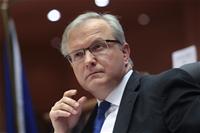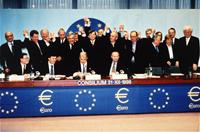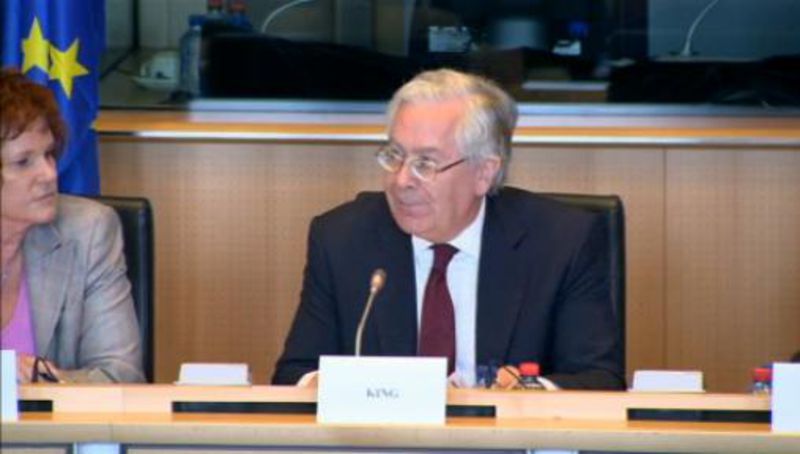The European commission “bites” countries with large deficits
Ralitsa Kovacheva, April 18, 2010
 “But we need to sharpen our teeth. We need to think ways of addressing cases of recidivists, who continuously break the rules. Penalties are possible even within the current Treaty but not always effectively used.”
“But we need to sharpen our teeth. We need to think ways of addressing cases of recidivists, who continuously break the rules. Penalties are possible even within the current Treaty but not always effectively used.”
If you have ever doubted that you would hear the European Commissioner for Economic and Monetary Policy Olli Rehn to speak that openly and sharply, this statement completely disproved you. On the eve of the informal EU finance ministers Council in Madrid, the commissioner revealed his cards. He announced that the Commission had discussed, as requested by the European Council, proposals to enhance economic policy coordination among member states in the context of the implementation of the new Article 136 of the Lisbon Treaty. It “enables us to explore new grounds for the euro area”, “through better and full use of the existing economic policy instruments”, Rehn explained. And he didn't exclude revision or creation of new secondary legislation, where needed. Moreover, said the Commissioner, this would be done with the “strong sense of urgency”:
“We do not have the luxury of time. Luckily, we do not need to reinvent the wheel. We know what needs to be done and we have the means to do it.”
Enhancing economic policy coordination has three main elements: reinforcing the Stability and Growth Pact, deepening and broadening of economic surveillance and setting up of a permanent crisis resolution mechanism.
The problem with the Stability Pact was compliance with rules, so we should reinforce the preventive and the corrective arms of the Pact, Olly Rehn explained. “That means coordination of fiscal policy should be conducted ex ante, i.e., in advance and in time to ensure the euro area -wide consistency and to be able to better guide national budgetary policies”. In other words, national budgets would no longer be only national prerogative and responsibility.
“We could create a "European economic semester" and integrate a European dimension into national budgetary processes. With the spill-over effects in the euro area economies, national is today a rather relative term.”
The Excessive Deficit Procedure should remain at the core of the implementation of the Pact, Rehn underlined, but insisted on “sharpen the teeth” to enable the Pact to bite recidivists .
The second element of a better coordination is broader and deeper surveillance, in  order to address macroeconomic imbalances and competitiveness divergences. “The gap between the surplus and deficit countries of the euro area has widened in the past ten years”, Rehn said. But stressed that this did not mean restrictions for the best performing countries, but to encourage those with poor performance. To illustrate the situation, the Finnish Commissioner gave an example, which was not very kind to the French football:
order to address macroeconomic imbalances and competitiveness divergences. “The gap between the surplus and deficit countries of the euro area has widened in the past ten years”, Rehn said. But stressed that this did not mean restrictions for the best performing countries, but to encourage those with poor performance. To illustrate the situation, the Finnish Commissioner gave an example, which was not very kind to the French football:
“I am not suggesting that Bayern München should play below its standard against Olympique Lyonnais, just to ensure an equal game. Rather, both Bayern München and Olympique Lyonnais should play better and improve their standard by making both offence and defence stronger, and ideally play as a European team, competitive at world level and strong domestically.”
The third main element for better coordination is crisis resolution. According to Rehn, “the ad-hoc mechanism for possible financial assistance for Greece serves the immediate need. However, it is necessary to set up a permanent crisis resolution mechanism with strong built-in disincentives for activation by making it so unattractive that no country would voluntarily use it.”
The Commissioner stressed that this “would only be an instrument of last resort, since the two primary building blocks of reinforcing the Pact and broadening surveillance should limit possible cases never getting this far.”
“But as we have learnt recently, even the worst developments can happen, so "better safe than sorry".”
Important detail is that these proposals “would be applied only in the euro area, but could be extended for the benefit of the EU-27, even if more stringent conditions should apply to the euro area member states.” And the proposal for a European economic semester could be an effective way of coordinating economic policies also within the entire European Union, the economic and monetary policy Commissioner commented.
 He reminded that the roots of enhanced economic policy coordination lie back in the history of the Stability and Growth Pact. Because “the original idea of the founding fathers was to develop from the beginning both economic and monetary pillars of the Economic and Monetary Union” which didn’t happen.
He reminded that the roots of enhanced economic policy coordination lie back in the history of the Stability and Growth Pact. Because “the original idea of the founding fathers was to develop from the beginning both economic and monetary pillars of the Economic and Monetary Union” which didn’t happen.
“Therefore, M is much stronger that E in the EMU. It is high time to fill the E with life, as well.”
The ALDE group in the European Parliament commended Olli Rehn for grasping “the bull by the horns” and urged EU finance ministers to back the plans to strengthen the rules in the eurozone. “For the long term stability of the Single Currency we absolutely need credible mechanisms for limiting public deficits and debt, including the possibility of sanctions for Member States who persistently exceed public sector spending limits". ALDE MEPs recommended the idea of a European Monetary Fund to be thoroughly examined for its feasibility within the existing framework of the Treaties.
The European Commission seems determined to go as far as the end this time. EurActiv quoted Commissioner Olly Rehn as saying the Commission was considering cutting regional aid (around 50 billion euro annual package) for all countries, persistently violating the Stability Pact.
After the informal Eurogroup meeting in Madrid on April 16, it got clear that Commission's concrete proposal would be announced on May 12. It will include enforcing European control over national budgets, as well as increasing economic integration and enforcement of the Stability and Growth Pact to include, aside from budgetary deficit, but also public debt indicators.
The Bulgarian finance minister Simeon Dyankov also took part in the ECOFIN informal meeting in Madrid. Although euinside wrote he might become the star of the evening because of the latest figures of the Bulgarian deficit, there was not even a word about that in the ministers' final statement. According to a press release of the Bulgarian Ministry of Finance however, the European Commission gave a "positive assessment" to the government' policy .
But the important thing is whether Bulgaria would learn from the Greek experience or would try Brussels sharpened teeth - is yet to be seen.
 | © European Union
| © European Union | © European Union
| © European Union | © European Union
| © European Union Angela Merkel, Emmanuel Macron | © Council of the EU
Angela Merkel, Emmanuel Macron | © Council of the EU Benoit Coeure | © Council of the EU
Benoit Coeure | © Council of the EU Pierre Moscovici | © Council of the EU
Pierre Moscovici | © Council of the EU